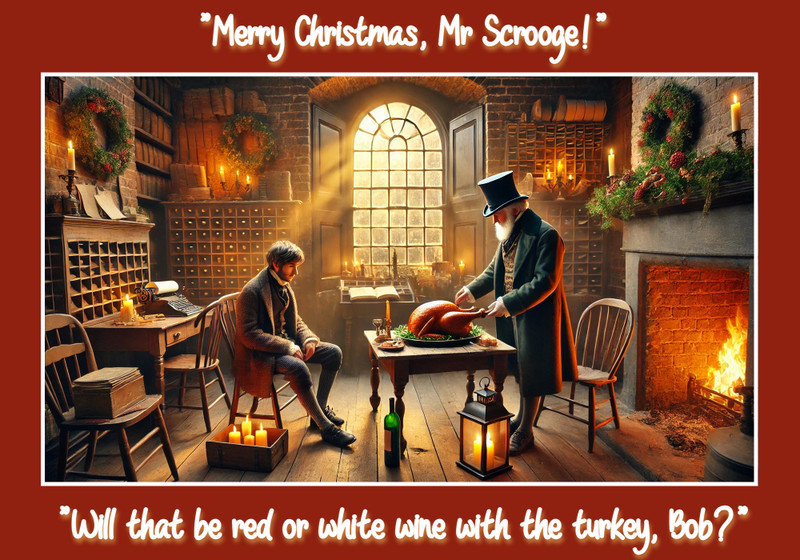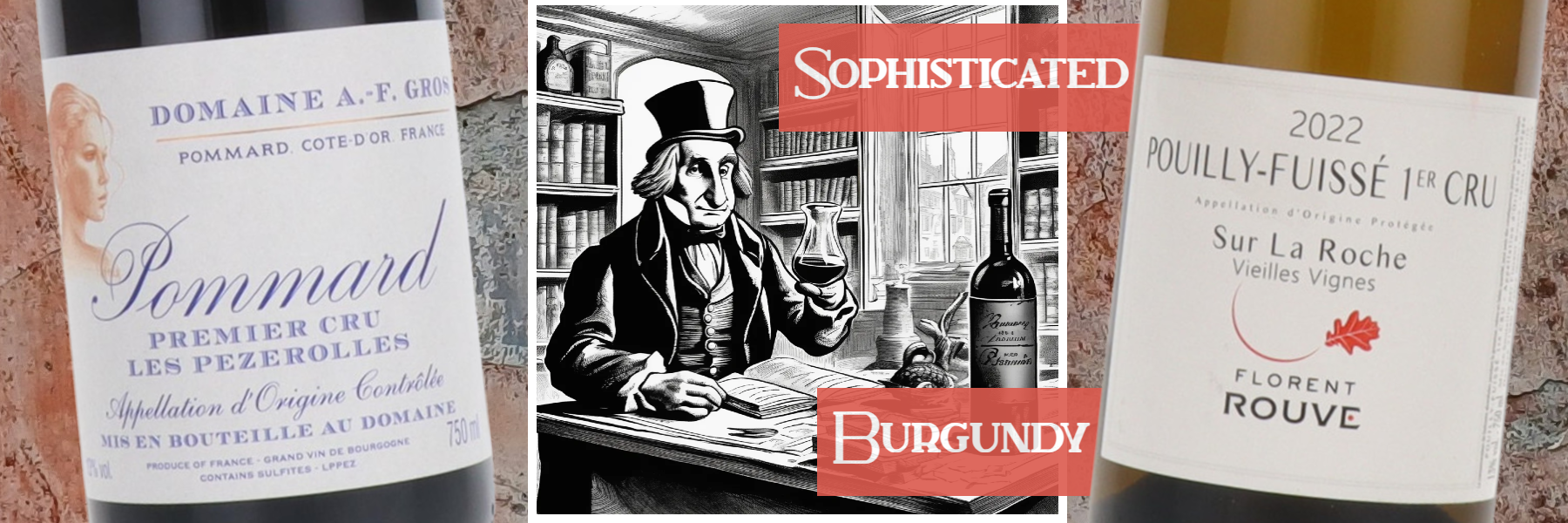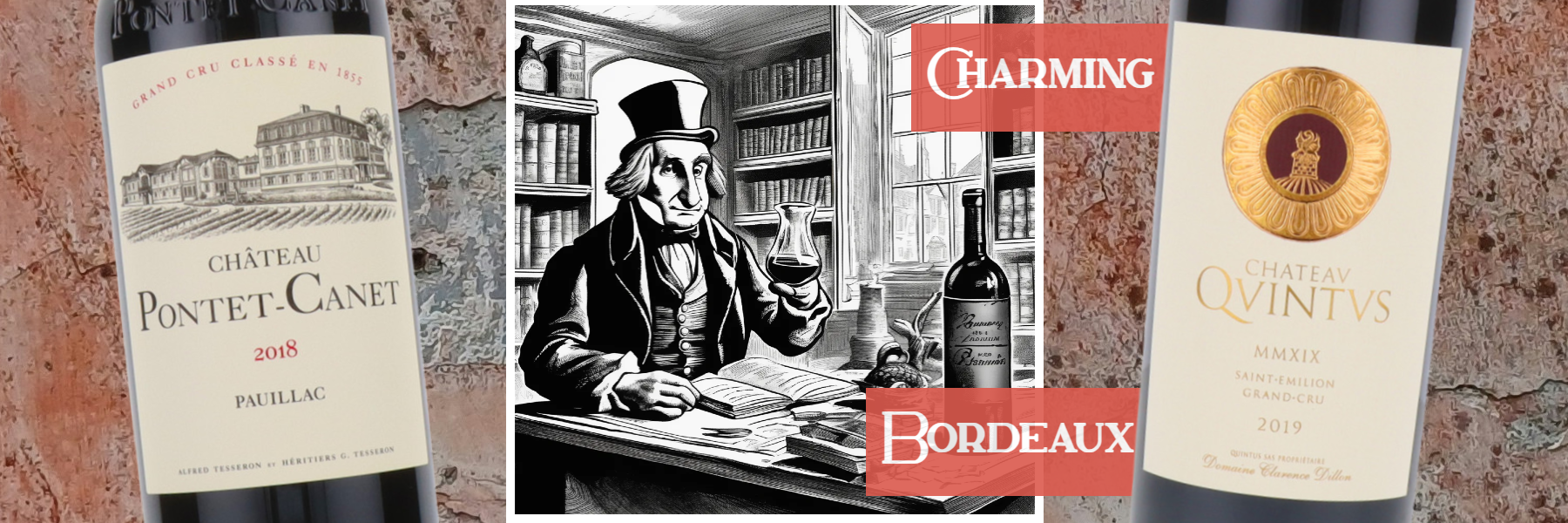There's a very well-known phrase : "Turkeys never vote for Christmas". Thankfully, they don't get to choose!
I realise that there are many options for indulging in the upcoming seasonal feasting these days, but, for myself, it's got to be a plump, roast turkey with all the trimmings. Perfectly fluffy potatoes and spicy butcher's sausages are compulsory extras along with stuffing for the bird. Obviously, it's time to bring out your best bottles of wine to support the ensuing merrymaking.
One of the most well known festive stories is Charles Dickens' "A Christmas Carol", where the interaction of vivid characters, featuring numerous scary ghosts, grumpy Scrooge, downtrodden Bob Cratchit and Tiny Tim, are shown their past, present and future life. A less appreciated part of the tale involves the freshly plucked, luxury "free range" Christmas turkey, which ( spoiler alert) ends up on the rickety table of Bob Cratchit's impoverished family. During this period in Britain's history, any accompanying alcoholic beverage is likely to have been cheap Sherry (or even cheaper Gin), with only the landed gentry being able to afford to drink decent Claret and Port. So, no wine for poor old Bob. Thankfully, times have changed for the better.
As we sit down for the most gloriously overindulgent meal of the year, there’s one question that divides families more than Monopoly ever could : what wine should we pair with this festive feast? Fear not, for I come bearing wisdom – and possibly a bottle or two – to convince you that classic French Burgundy or Bordeaux is the only answer to your turkey troubles. Well, almost. Stick around, and I'll throw in some alternative suggestions for those of you who fear the wrath of the family's overbearing, know-it-all "wine buff". There's always one!
Turkey Troubles and the Art of the Perfect Pairing
First, let’s talk turkey. The centrepiece of your Christmas dinner is a culinary paradox. Turkey is simultaneously majestic and bland – a blank canvas just waiting for the cranberry sauce, gravy, and stuffing to slather it with personality. Add in a supporting cast of roast potatoes, honey-glazed carrots, and the evil brussel sprouts (they will divide the table), and you’ve got a plate with more conflicting flavours than even a Christmas special of "Strictly..." can offer.
This is where wine swoops in like Rudolph leading the charge of Santa's sleigh. The right bottle can be the glue that ties this gastronomic cacophony together, balancing richness with refreshment and offering just enough of that elusive "wow factor" to make everyone forget about your lumpy gravy. This, dear reader, is why Burgundy or Bordeaux takes the crown.
Burgundy: The Sophisticated Friend Everyone Likes
Let’s start with Burgundy, the classic French wine region known for its elegant reds made from Pinot Noir and whites crafted from Chardonnay. Now, before you roll your eyes at the suggestion of a “fancy French Pinot,” let me assure you that Burgundy is not all nose-in-the-air elitism. Think of it as the friend who wears designer clothes but always brings the best cheese to the party (and who doesn't appreciate great cheese?).
Pinot Noir is a magical match for turkey. Its light to medium body won’t overpower the delicate meat, while its bright acidity cuts through the richness of the stuffing and gravy. Burgundy reds often have earthy, mushroomy notes that accentuate the savoury flavours of sage and onion stuffing. They also boast a subtle fruity quality – cherries and cranberries – that complements the tartness of cranberry sauce. It’s as if Pinot Noir was specifically invented to save your turkey from the abyss of dryness.
For the white wine enthusiasts, Burgundy’s Chardonnay is no slouch either. The best examples, with their creamy texture and whispers of toasted oak, harmonise beautifully with buttery, mashed potatoes and the crispy skin of roast turkey. They also have enough citrusy zip to keep your palate from falling into a post-roast coma!
Bordeaux: The Bold Hero We All Secretly Love
If Burgundy is the elegant friend, Bordeaux is their irresistibly charming sibling. Known for its structured reds, Bordeaux delivers a blend of Merlot, Cabernet Sauvignon, and Cabernet Franc that can handle even the richest Christmas fayre. Think of it as the wine equivalent of a Yorkshire pudding : robust, comforting, and impossible to say no to.
Bordeaux is ideal if you like your turkey dinner to come with a side of drama. Its deep fruit flavours – blackcurrants, plums, and cherries – bring a festive flair, while its tannins (those grippy mouth-drying compounds) are just the ticket to cut through the fat of pigs in blankets and goose-fat roasties. The wine’s savoury, herbal undertones also play nicely with all those woody herbs you’ve stuffed into your turkey's cavity.
And let’s not forget the whites of Bordeaux, made predominantly from Sauvignon Blanc and Sémillon. These crisp, aromatic wines are a dream with lighter, citrusy sides like orange zest-glazed carrots or lemony sprout salads (if your family can handle such modern heresy).
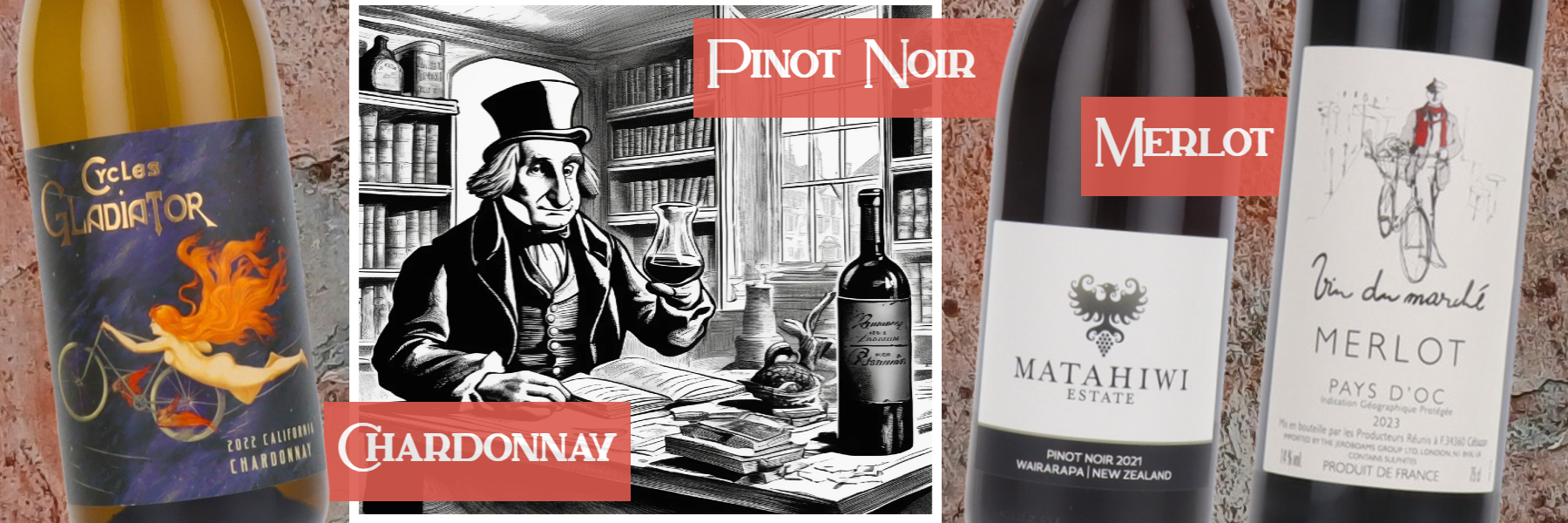
But What About… Great Value Alternatives?
Let’s face it , not everyone wants to splash out on a fine bottle of Burgundy or Bordeaux. For those seeking something a little less grandiose, but equally delightful, here are some alternatives:
1. Chardonnay
Chardonnay deserves better than its reputation as the basic wine of choice for reality stars. A good bottle of lightly oaked Chardonnay – think something from the Mâconnais in southern Burgundy or a New World region like California – can do wonders with roast turkey. Its buttery smoothness and zesty acidity make it the Swiss Army knife of Christmas wine, pairing effortlessly with everything from creamy parsnips to cheesy cauliflower bake.
2. Pinot Noir
If Burgundy itself feels like a stretch, opt for a Pinot Noir from elsewhere. New Zealand, for instance, produces some cracking examples with ripe berry flavours and a touch of spice. These wines are slightly more fruit-forward than their French cousins, making them a great match for turkey’s mild flavour. Plus, they’re generally more affordable – perfect if you’ve got a table full of thirsty relatives.
3. Merlot
If Bordeaux is out of reach, consider its softer, cuddlier cousin : Merlot. Often dismissed as “too safe,” Merlot is actually a Christmas miracle in disguise. Its velvety texture and plummy fruit flavours are a delight with turkey, while its low tannins mean it won’t overwhelm the sides. Go for a bottle from the Pays D'Oc in the south of France, or venture into Chilean territory for a wallet-friendly option.
Pairing Tips for Maximum Festive Bliss
- Temperature Matters: Reds like Pinot Noir or Merlot can benefit from a slight chill. About 15°C-18°C is perfect – cool enough to refresh but warm enough to release those lovely aromas.
- Don’t Forget the Glassware: Get yourself some decent quality wine glasses. Why rob yourself of the joy of swirling and sniffing all those beautiful aromas?
- Have Both Red and White on Hand: Some guests will insist on one or the other, and it’s Christmas – no one needs an argument over wine preferences.
The Grand Finale
At the end of the day, the best wine for your Christmas dinner is the one that makes you happiest (and, ideally, the one that pairs nicely with leftover turkey sandwiches). But if you’re aiming for a match made in heaven, classic French Burgundy or Bordeaux is the way to go. Their nuanced flavours and festive flair elevate even the most haphazardly cooked turkey into something Michelin-starred and, if you want to veer off the beaten path, a well-chosen Chardonnay, Pinot Noir, or Merlot will do the job splendidly – with enough change left over for a good Christmas pudding Cognac.
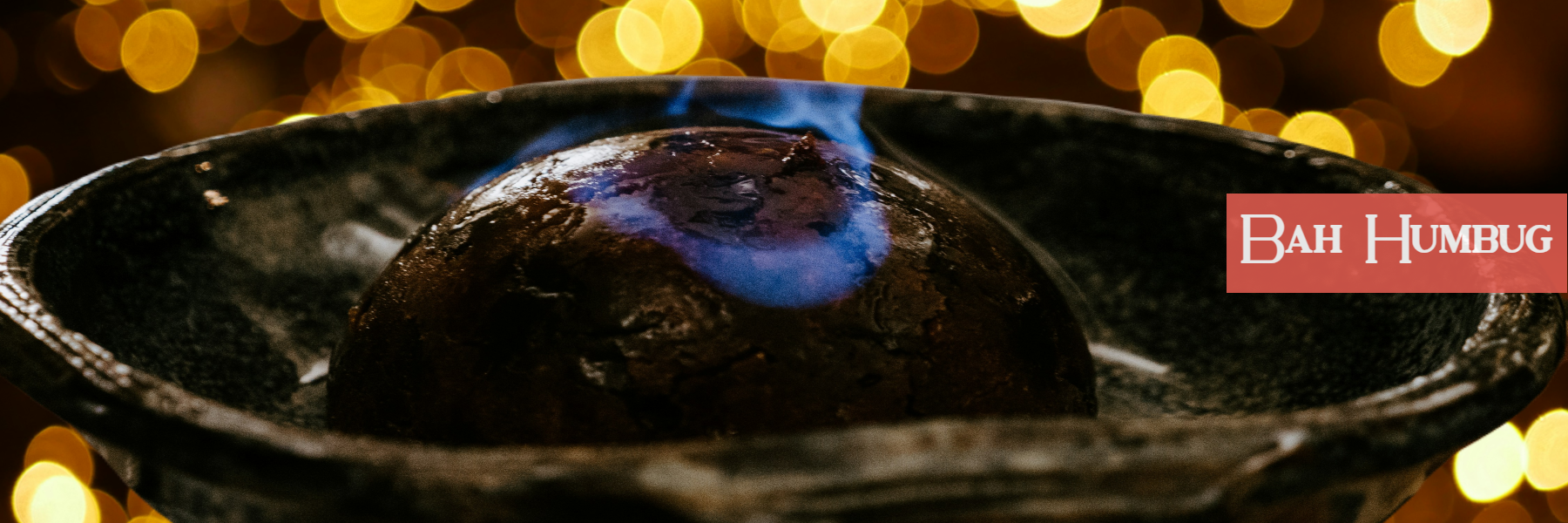
So, pour yourself a second glass, give thanks for stretchy trousers, and toast to a memorable Christmas dinner. Just remember to stand well back when igniting the brandy soaked pudding. I'm sure that Scrooge would announce, "Bah, humbug!", if you wasted a superior VSOP on such an occasion. But why listen to him? He's always had a reputation for being tight so, go on, indulge yourself.
Forgive me, I almost forgot to mention finishing the meal with a dessert wine. Tradition suggests that it should be a Sauternes (we're back to Bordeaux again). Many come in handy half-bottles and a little goes a long way with these wines.
Now, who brought my favourite cheese... and which wine will go best with it?

